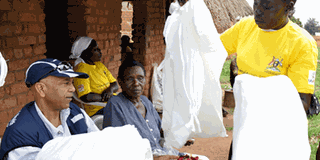Why sub-standard mosquito nets continue flooding market

Global Fund facilitators during distribution of mosquito nets in Arua District. FILE PHOTO
What you need to know:
UNBS mandate. The UNBS is required to prohibit entry of substandard products and seize for destruction or re-exportation at the expense of the importer.
With malaria endemicity standing at 95 per cent, Uganda is among countries which refocused its fight against the disease in line with the global strategies. In 2017, Uganda launched its second universal distribution of Long-Lasting Insecticidal Nets (LLINs) and stopped concentrating only pregnant women and children under five. Other global strategies recommended by the World Health Organisation (WHO) are indoor residual spraying, test, treat and tracking of malaria cases.
Despite the LLIN campaign where two people in each household of 85 per cent population received a net, Uganda is still ranked sixth worldwide with malaria deaths. The persistent annual new malaria cases may be attributed to continued importation and consumption of sub-standard nets.
The WHO estimates that Uganda spent over $200 million on malaria in 2017, contributed mainly through grants from partners such as the Global Fund to Malaria, TB and HIV and USAID Presidential Malaria Initiative. Much of these funds were allocated to malaria management, human resource and technical assistance, insecticides and spray materials. No funds were allocated to ITNs.
When the government liberalised trade in the country more than 15 years ago, many business people in the private sector ceased the opportunity to earn money. Fully aware that some of the products, mosquito nets included to be imported and sold would be substandard, the government established the Uganda National Bureau of Standard (UNBS).
UNBS is mandated to inspect all imports entering the country to protect the public’s health and safety as well as the environment against dangerous and sub-standard products. The Bureau is supposed to inspect for quality upon arrival at the entry points, checking documents and physically inspecting the goods. In addition, some goods such as mosquito nets require Pre-export Verification of Conformity (PVoC) from the exporting country. However, it is not clear which products UNBS’ appointed agents to conduct PVoC in the United Arab Emirates, England and Switzerland inspect.
The UNBS is required to prohibit entry of substandard products and seize for destruction or re-exportation at the expense of the importer. Further, when UNBS receives information about substandard goods on the Ugandan market, it is supposed to quickly investigate and when found, remove them from the market. Unfortunately, UNBS rarely receives such information since hawkers sell substandard nets on streets or in traffic jams in the evening, long after office hours.
In 2013, government, the largest importer of LLINs flouted its own guidelines when the Ministry of Health imported substandard nets for its first national mass distribution anti-malaria campaign. The nets were meant to benefit 21 million people in Uganda. The UNBS found the nets faulty in terms of weight of 37.5/square metre against the recommended 35g/square metre by WHO. The nets passed the wire mesh which is essential for determining if a mosquito can penetrate the material. It is also important for aeration of the user. The Ministry of Health pleaded with UNBS to release the nets, which are believed to have later been distributed to the public.
Today it is not clear if government fulfils UNBS’ requirements of importing nets, as is not the case with the private sector. Despite repeated warnings from the Ministry of Health to the private sector to stop importing substandard nets, crafty business people exploit system loopholes to import the nets.
The Ministry of Health also informed Uganda Revenue Authority to ban importation of substandard nets. But the Authority is required to clear only what UNBS has sanctioned. And it is often impossible to clear all products with few UNBS inspectors to monitor more than 100 porous inland custom posts. UNBS officials are usually stationed at major entry points like Kampala, the country’s capital, Malaba, and Busia in eastern Uganda. Sometimes the nets are smuggled stuffed in cushions of imported furniture such as sofa sets.
Hence, sub-standard nets continue flooding the market and are sold at $1 unlike LLINs which cost $27.7 a piece. As ordinary people buy substandard nets, they are ignorant that without treatment, they do not protect them against mosquitoes.
Ms Bakyawa is a journalist with a bias in health reporting.




